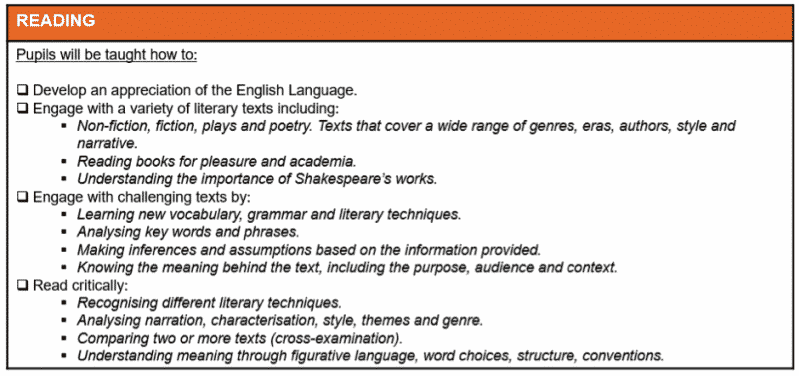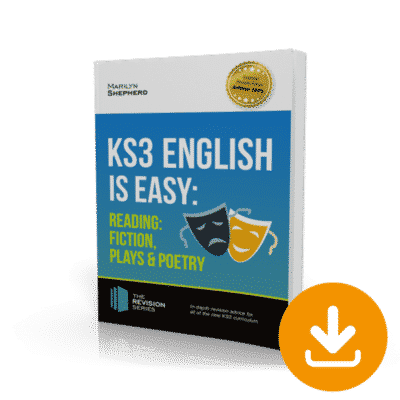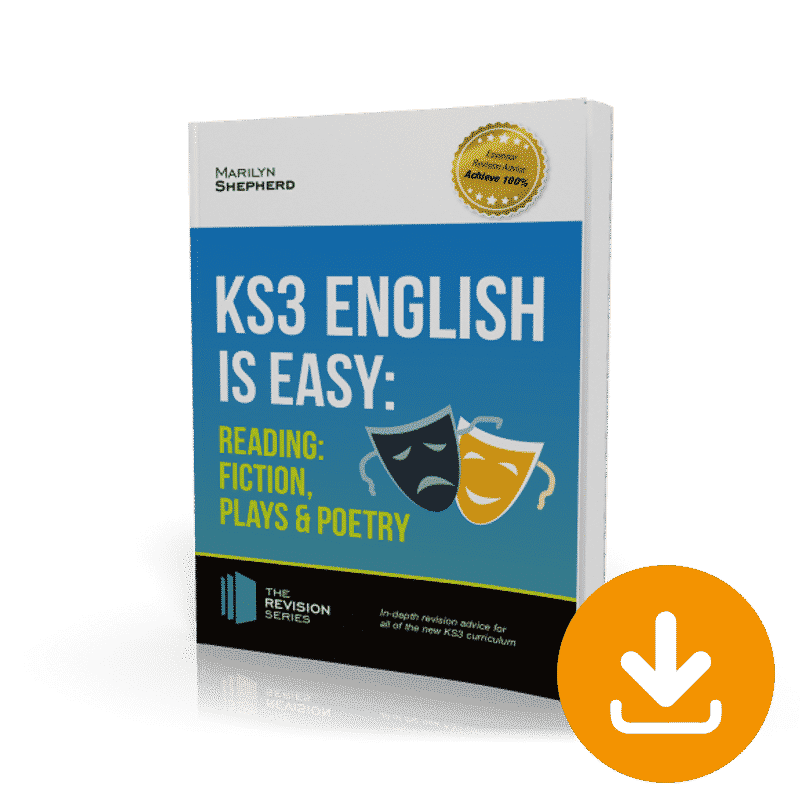KEY STAGE 3: ENGLISH FICTION, PLAYS AND POETRY
- 120-page interactive guide for KS3 English;
- Advice for both your child and you;
- Up-to-date with the new national curriculum;
- English taught in a fun and engaging way from award-winning creators;
- An easy to follow breakdown of each topic;
- Questions, games and quizzes to track your progress;
- Achieve 100%!
Key Stage 3 English Is Easy – Fiction, Plays and Poetry
From an early age, children should be encouraged to read as much as they can. Reading not only improves vital life skills, but also provides great education, promotes creativity and encourages a world full of books and literature.
Our KS3 English Reading (Fiction, Plays and Poetry) guide not only provides your child with the best resources to practice their reading skills, but it will also allow them to undergo analysis and interpretation for a range of different literary texts.
In order for a child to do well in their English assessment, they need to be able to demonstrate the following skills:
- Being able to read fluently;
- Being able to identify narrative, structure and meaning from a literary text;
- Identify who the target reader is, and how the writer appeals to this demographic;
- Analyse key quotes from the passage, identifying possible meanings and interpretations;
- Being able to “read between the lines” to understand what the author means by something.
Below is a detailed breakdown of how reading is assessed during the Key Stage 3 English assessments.
Use this as a guideline to understand how to improve your child’s learning, and what areas to focus on.

Understanding Your Guide
This guide focuses specifically on the Key Stage 3 Reading (Fiction, Plays & Poetry). This guide will cover the entire English assessments which will be used during classroom learning and school exams. Thus, this book is the IDEAL guide to complement your child’s education.
By the end of this guide, you will have a strong knowledge regarding the following:
|
UNDERSTANDING THE CURRICULUM |
LEARN KEY TERMS | INCREASE YOUR CHANCES WITH OUR TOP TIPS |
|
UNDERSTANDING FICTION |
UNDERSTANDING PLAYS |
UNDERSTANDING POETRY |
|
LANGUAGE |
CHARACTERS |
THEMES |
| IMAGERY | STRUCTURE |
NARRATIVE |
Sample KS3 ENGLISH Questions
FICTION
Jane Eyre by Charlotte Bronte
The red-room was a square chamber, very seldom slept in, I might say never, indeed, unless when a chance influx of visitors at Gateshead Hall rendered it necessary to turn to account all the accommodation it contained: yet it was one of the largest and stateliest chambers in the mansion. A bed supported on massive pillars of mahogany, hung with curtains of deep red damask, stood out like a tabernacle in the centre; the two large windows, with their blinds always drawn down, were half shrouded in festoons and falls of similar drapery; the carpet was red; the table at the foot of the bed was covered with a crimson cloth; the walls were a soft fawn of colour with a blush of pink in it; the wardrobe, the toilet-table, the chairs were of darkly polished old mahogany. Out of these deep surrounding shades rose high, and glared white, the piled-up mattresses and pillows of the bed, spread with a snowy Marseilles counterpane. Scarcely less prominent was an amble cushioned easy-chair near the head of the bed, also white, with a footstool before it; and looking, as I thought, like a pale throne.
The room was chill, because it seldom had a fire; it was silent, because remote from the nursery and kitchen; solemn, because it was known to be so seldom entered. The house-maid alone came here on Saturdays, to wipe from the mirrors and the furniture a week’s quiet dust: and Mrs. Reed herself, at far intervals, visited it to review the contents of a certain secret drawer in the wardrobe, where were stored divers parchments, her jewel-casket, and a miniature of her deceased husband; and in those last words lies the secret of the red-room – the spell which kept it so lonely in spite of its grandeur.
Mr. Reed had been dead nine years: it was in this chamber he breathed his last; here he lay in state; hence his coffin was borne by the undertaker’s men; and, since that day, a sense of dreary consecration had guarded it from frequent intrusion.
QUESTION 1
What connotations do you think are attached with the colour of this room?
QUESTION 2
Why do you think Bronte describes the room as being “chill”? Use a quote from the extract to emphasise this idea of coldness.
QUESTION 3
“Mr. Reed had been dead nine years: it was in this chamber he breathed his last.”
Describe the atmosphere this sentence creates.
PLAYS
Romeo and Juliet by William Shakespeare
ROMEO
If I profane with my unworthiest hand
This holy shrine, the gentle sin is this:
My lips, two blushing pilgrims, ready stand
To smooth that rough touch with a tender kiss.
JULIET
Good pilgrim, you do wrong your hand too much,
Which mannerly devotion shows in this;
For saints have hands that pilgrims’ hands do touch,
And palm to palm is holy palmers’ kiss.
ROMEO
Have not saints lips, and holy palmers too?
JULIET
Ay, pilgrim, lips that they must use in prayer.
ROMEO
O, then, dear saint, let lips do what hands do;
They pray; grant thou, lest faith turn to despair.
JULIET
Saints do not move, though grant for prayers’ sake.
ROMEO
Then move not, while my prayer’s effect I take.
He kisses her.
Thus from my lips, by yours, my sin is purged.
JULIET
Then have my lips the sin that they have took.
ROMEO
Sin from thy lips? O trespass sweetly urged!
Give me my sin again.
They kiss again
QUESTION 1
What imagery is conveyed throughout the passage? How does this appeal to the audience?
QUESTION 2
From the opening of this passage, to when Romeo first kisses Juliet, there are 14 lines of spoken English. How does this convey poetic conventions and what does this tell the audience about their relationship?
QUESTION 3
What does “my unworthiest hand” mean? How does this tie in with family conflict?
POETRY
Poems 1 – 3 by How2Become
POEM 1
There once was a turtle named Joe,
Considered the slowest of the slow.
He entered the race,
With slow as his pace,
On your marks, get set, go!
POEM 2
There once was a giant so smelly,
Proud of his overgrown belly.
Feared by all,
Except his friend Paul,
Who told him to cut down on his jelly.
POEM 3
There was a boy who loved French bread,
Whose dear mother had often said:
‘Cut down or you’ll bloat,
Like an oversized goat,
You’ll never get out of bed’.
QUESTION 1
What type of poems are poems 1, 2 and 3? Circle one
- Haikus
- Tanka
- Limerick
- Sonnet
QUESTION 2
Give a definition of the poem you have circled.
QUESTION 3
Describe how all three of these poems have a similar rhythmic structure. Compare at least two poems.
FICTION
Q1.
The colour of red connotes this idea of mystery, blood, danger, desire, passion or power. There are lots of other connotations of the colour red, but from this extract it mostly connotes an intense feeling that possibly something bad or emotional has happened in the room.
Q2.
Bronte describes the room as being a “chill” because it demonstrates how the room has been left deserted and empty. The “chill” could also imply a chilling feeling, as if someone is on edge being in the room. A chill could also suggest a ghostly figure.
Q3.
The fact that a person died in the room creates an intense and ghostly atmosphere. The author also draws on these feelings by stating that the room has a “chill”, which again implies an eerie atmosphere.
Considering that “Mr. Reed had been dead nine years” implies how the room has been left unattended ever since, and therefore has built up a sense of abandonment.
PLAYS
Q1.
Both Romeo and Juliet use language which clearly makes reference to religion. This is established through the use of the words, “holy shrine,” “saints,” “prayer” and “sin.” The use of religious imagery in Shakespeare’s language conveys the idea of purity, and how the characters of Romeo and Juliet are drawn to one another, just as pilgrims are drawn to the holy shrine. At the time, religion played a huge role in society, and therefore audiences would be able to relate to this.
Q2.
The use of rhythm allows the audience to feel a sense of romance. The structure follows an AB rhyme scheme. For example, “If I profane with my unworthiest hand / This holy shrine, the gentle sin is this: / My lips, two blushing pilgrims, ready stand / To smooth that rough touch with a tender kiss.” This shows how Shakespeare uses poetic techniques in order to emphasise themes such as love and passion.
Q3.
The phrase “My unworthiest hand” implies that Romeo does not deem himself as being a worthy suitor for Juliet. The fact that his hand is unworthy foreshadows conflict between his family (the Montagues) and her family (the Capulets).
POETRY
Q1.
Limerick
Q2.
A limerick is a poem that uses rhythm and rhyming patterns with the intention to be funny and/or silly.
Q3.
In all of the poems, they all follow the same rhythmic structure. The last word of the first, second and last line rhyme. The third and fourth line rhyme. For example, in Poem 1, lines 1, 2 and 5 end with the words “Joe”, “slow” and “go”. Lines 3 and 4 end with the words “race” and “pace”. In Poem 3, lines 1, 2 and 5 end with the words “bread”, “said” and “bed”. Lines 3 and 4 end with the words “bloat” and “gloat”.
FREE BONUS
When you order you will receive the following free bonus;

Plus 30-days FREE ACCESS to the Educational online testing suite. Thereafter, just £5.95 per month. No minimum term. You may cancel anytime. Cancel before the 30-days are up and you will not be charged. Online suite access on PC, MAC and mobile devices.

✓ 30-Day Money-back Guarantee

✓ 30-Day Money-back Guarantee
Did you know? All orders with How2Become are protected by our 30-day money-back guarantee. What ever the reason…or no reason at all…you can have your money back if this resource isn’t right for you (see our terms for full details).
















